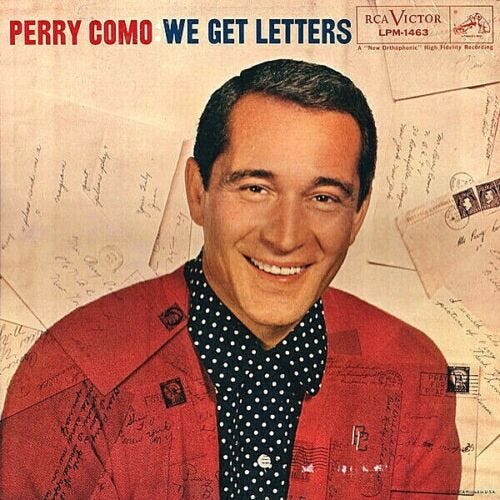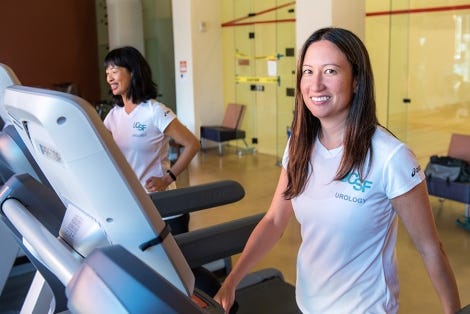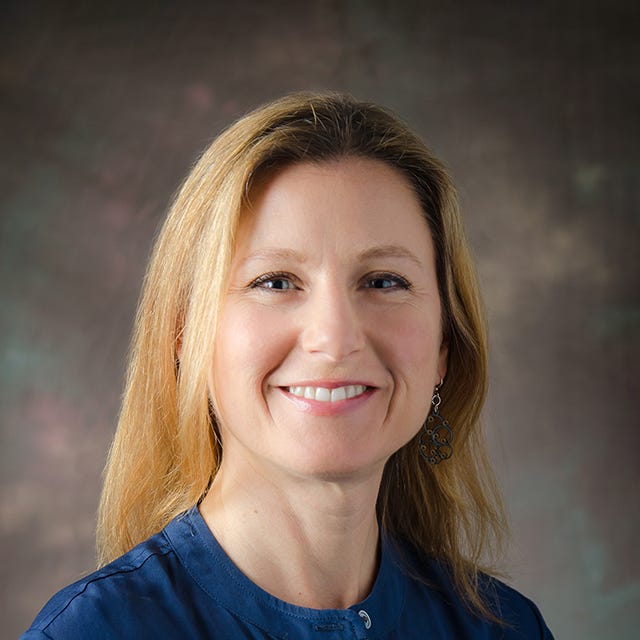My letter in the Journal of National Cancer Cancer Institute--one small step for patientkind
A call for more inclusion of patients in research and setting policy
“Gimme a ticket for an aeroplane
Ain't got time to take a fast train
Lonely days are gone, I'm a-goin' home
My baby, just-a wrote me a letter”—The Box Tops (1967).
By Howard Wolinsky
I don’t recall ever writing a Letter to the Editor. And it’s been years since I wrote any sort of letter to my baby or otherwise.
But for the first time, I wrote one a letter—as a low-risk prostate cancer patient and advocate— and the prestigious Journal of the National Cancer Institute published it. In 500 words, I shared some data from the survey of 450 patients on their thoughts about active surveillance should Gleason 6 lesions be redefined as non-cancers.
This week, my letter appeared in JNCI: https://academic.oup.com/jnci/advance-article/doi/10.1093/jnci/djad160/7243176?login=false
The acceptance process was harder than I expected. I first had to clear hurdles to persuade the editor that my contribution was worthy of his audience. There are loads of competition for the limited space in the journal to reach busy cancer experts.
Like 1950s TV crooner, Perry Como, JCNI gets stacks and stacks of letters.
My letter was accepted within a few days. The time-consuming part was learning how to navigate JNCI’s Byzantine content management system and to answer of stream of questions and stay within the word limit. Fortunately, an editorial staffer helped walk this bewildered stranger through the process as I encountered frustration after frustration. (Thanks, Ashley.)
Also, I had to give up on explaining to their editors that I was a simple Mr., not a Dr. This publication is aimed at people with fancy degrees, not patients.
What motivated me to write the letter was an editorial in JNCI written by Yaw Nyame, MD, MS, MBA, et al. highlighting the important role patients can play in scientific research and in establishing policy.
I agreed wholeheartedly.
In the past couple of years, I have been involved in studies as a co-author, offering the patient point-of-view. Increasingly, patients are being involved as co-authors and co-researchers.
'I also have been involved as a patient reviewing guidelines for low-risk prostate cancer as a volunteer with the AnCan Foundation for the American Urological Association and as a volunteer for Malecare for proposals for the U.S. Department of Defense Congressionally Directed Research Program.
The UW crew used as an example the debate over whether Gleason 6 (Grade Group 1) should be renamed as a noncancer.
“Incorporating the patient voice as a research partner creates value and drives meaningful study design and implementation,” wrote Nyame, a urologic oncologist. “In prostate cancer, important clinical ideas have demonstrated implementation difficulties (i.e., accrual challenges) in several clinical trials addressing important topics. These difficulties may have been diminished had patients been meaningfully engaged in discussions around the prioritization of these topics and in the design of these studies.”
They were right in my wheelhouse. I have been deeply involved with the effort to rename Gleason 6 led by Dr. Scott Eggener of the University of Chicago, who put me on Active Surveillance 13 years ago this December.
Nyame and his colleagues cited two papers on which, as it happens, maybe not surprisingly considering the topic, I, as a patient, was a co-author:
-- Eggener SE, Berlin A, Vickers AJ, Paner GP, Wolinsky H, Cooperberg MR. Low-grade prostate cancer: time to stop calling it cancer. J Clin Oncol (JCO). 2022;40(27):3110-3114. doi:10.1200/JClinOncol.22.00123.
(Note: This controversial paper was the best-read paper in JCO in 2022. It includes part of my experience with the “financial toxicity” of insurance discrimination for not treating my cancer and also my observations on the emotional distress I have observed in patients in AS-only support groups I co-founded.)
--Berlin A, Ramotar M, Santiago AT, et al. The influence of the ‘cancer’ label on perceptions and management decisions for low-grade prostate cancer. J Natl Cancer Inst. 2023. doi: 10.1093/jnci/djad108.
The UWashington editorial writers also mentioned an offsite meeting during the American Society of Clinical Oncology Genitourinary Cancers Symposium in February 2023, where a process was launched to consider renaming Gleason.
I was there. In fact, I presented the results of the patient survey that was a follow-up to the original Eggener et al. paper.
(Side note: As a result of this presentation, the Centers for Disease Control and Prevention invited me to collaborate with them to re-field the survey to reach a broader audience. The proposal easily cleared all hurdles at the CDC and will be put up for bids. CDC staff are excited about this—me too—but they warned me that there is one final obstacle—Congressional approval for funding. I’m not holding my breath.)
The survey, organized by patient volunteers from the AnCan Foundation, Active Surveillance Patients International, Prostate Cancer Support Canada, and some bigshot prostate experts, shared the collective voice of 450 patients about whether low-risk Gleason 6 lesions should be redefined as a noncancer. (I was the lead author, and my wingman was our senior author, the late, great Herb Geller, PhD, a PCa patient, AnCan board member, and neurobiology lab director at the National Institutes of Health. See below for more details.)
Nyame wrote: “It is unclear from the work of Berlin and colleagues how patients would feel about name changes with these risks for reclassification and/or treatment over 10-15 years.”
Really? Our patient-led survey answered this question by going to the patients. It was precisely what the UW doctors were recommending. But apparently, the researchers missed our survey.
That’s why I decided to write the letter to get them and JNCI readers up to speed.
My final point in the JCNI letter was supporting patient involvement in research and setting policy: “As a patient and co-founder of support groups for patients on AS, I agree with the authors that the patient voice should be heard in these discussions--from the examining room to writing guidelines and conducting studies.”
What our patient survey found
By Howard Wolinsky
The survey of 450 patients who are on or were on active surveillance for low-risk prostate cancer found that only 5% thought they would drop surveillance if Gleason 6 were relabeled as a noncancer, and 82 percent would stay the course. The remainder were undecided. Here’s the scoop:
My so-called academic life
By Howard Wolinsky
Dr. Scott Eggener of the University of Chicago, my former urologist and my co-author on several controversial articles on reclassifying low-risk prostate cancers in the Journal of Clinical Oncology, kids me about beginning my academic career late—in my mid-70s. (I turn 76 on September 29.)
I gather he doesn’t count my decade of teaching graduate medical journalism students at the storied Medill School at Northwestern as well as at UChicago and DePaul U.
In the past year or so, I have had a half dozen articles published as a co-author in academic journals and presented an abstract—summary—offsite during a major scientific meeting.
My life seems to be taking some new, unexpected directions.
I had a sudden flash earlier this year while taking a shower—that’s where all my great ideas come from. You, too?—that I ought to get serious and learn more about statistical methods, social determinants of health, etc.
This fork in the road led me a few weeks ago to enter the MPH (Masters in Public Health) degree program at the University of Illinois at Chicago School of Public Health. I am slow-cooking this. I may finish by age 80—if I’m lucky.
Well, I should stop. As my wife Judi and sons keep reminding me—I have some homework to do.
PCRI is holding a virtual webinar this weekend
Don’t miss the Prostate Cancer Research Institute’s 2023 Virtual Program. Sign up at PCRI.org Details to come. Special note: 1from 0:30 a.m.-12:30 p.m. Eastern Sunday, Dr. Matt Cooperberg, of UCSF, one of the champions of Active Surveillance, will be giving an update on AS.
Don’t miss: Active Surveillance Patient International Sept. 30 webinar on lifestyle and low-risk PCa
By Howard Wolinsky
During September's Prostate Cancer Awareness Month, Active Surveillance Patients International (ASPI) is sponsoring a free webinar on lifestyle research and low-risk prostate cancer from 12-1:30 p.m. Eastern, Saturday Sept. 30.
There’s still time to register here for “Applied Research and Lifestyles and Low-Risk Prostate Cancer:
https://zoom.us/meeting/register/tJwvdOGoqjwuE9CC8AI45nYdsj63e-iUnop6
(Dr. Stacey Kenfield, on right, & Dr. June Chan, working out. Mario Sanchez UCSF.)
The program focuses on how men can take some control over their lifestyle, including eating, exercise, and exposure to known carcinogens. The program also will cover how mental health behavior may help the patient adhere to a healthy lifestyle. Please submit any questions ahead of the program to contactus@aspatients.org.
The program includes:
—Dr. June Chan, of UCSF, on “The Role of Exercise for Deterring Prostate Cancer Progression/Death”;
—Dr. Stacey Kenfield, of UCSF, on “The Role of Diet for Men Living with Prostate Cancer”;
—Chan on “Lifestyle Scores & Prostate Cancer Progression”;
—UCSF dietician Greta Macaire on “Practical Advice on Diet for Men Living with Prostate Cancer”;
(UCSF dietitian Greta Macaire)
For more information:
Meanwhile, get the UCSF pamphlet on diet recommendations for men with prostate cancer: https://urology.ucsf.edu/sites/urology.ucsf.edu/files/uploaded-files/basic-page/diet-recommendations-pamphlet.pdf
And diet tips:
More free webinars
—Focal therapy? Listen to AS pioneer Dr. Laurence Klotz: https://ancan.org/webinar-is-focal-therapy-right-for-your-prostate-cancer/
—Lifestyle? Catch ASPI’s webinar with Dr. Stacy Loeb, of NYU, on lifestyle factors, such as diet. Great talk on a plant-based diet: https://aspatients.org/meeting/as-101-program-on-diet-and-nutritional-lifestyle/
—DNA. Todd Morgan, MD, chief of urologic surgery at the University of Michigan (Go Blue!) presented a great program on genomics to an AnCan webinar on Aug. 31. The video is available now for your viewing: https://ancan.org/webinar-how-and-why-prostate-cancer-genomic-tests-work/









Ha.
Howard,
Congratulations! You are a "man of letters" for sure!